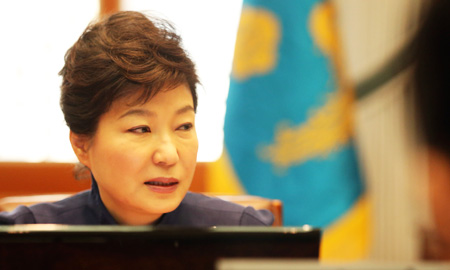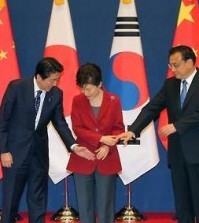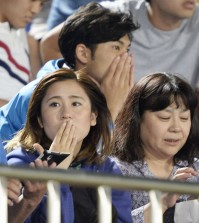- California Assembly OKs highest minimum wage in nation
- S. Korea unveils first graphic cigarette warnings
- US joins with South Korea, Japan in bid to deter North Korea
- LPGA golfer Chun In-gee finally back in action
- S. Korea won’t be top seed in final World Cup qualification round
- US men’s soccer misses 2nd straight Olympics
- US back on track in qualifying with 4-0 win over Guatemala
- High-intensity workout injuries spawn cottage industry
- CDC expands range of Zika mosquitoes into parts of Northeast
- Who knew? ‘The Walking Dead’ is helping families connect
President Park Geun-hye denounces Abe’s controversial visit
By Kim Tae-gyu, Chung Min-uck
President Park Geun-hye on Monday denounced Prime Minister Shinzo Abe’s controversial visit to the Yasukuni Shrine last week, sending a message that her government will deal sternly with Japan’s nationalist moves.
Abe, who has been slammed for his lack of contrition over Japan’s past wrongdoings, became the first sitting prime minister to visit the controversial temple in Tokyo in more than seven years.
“I wish no one would dig up wounds of the past to hurt the trust between countries and exacerbate people’s feelings,” she said in a remark obviously directed at Japan.
Park added that however wealthy a country may be, it cannot be a top-rated member of the international community if its actions are not in line with universal values and standards, another allusion to Japan, the world’s No. 3 economy.
Foreign Minister Yun Byung-se also said Monday that already strained relations between Seoul and Tokyo can only worsen following the Japanese premier’s recent visit to the controversial war shrine.
“Further repercussions on the tension-ridden relations between South Korean and Japan are inevitable,” Yun said at a meeting of the National Assembly’s Foreign Affairs Committee. “Given the seriousness of the latest incident, it will be difficult, in my understanding, to hold high-level diplomatic and security meetings between the two countries down the road.”
“Seoul will continue to keep its resolute stance on historical awareness issues with Japan,” the minister added.
He also noted that Korea will seek collaboration with the international community to deal with what he called the “unjust historical perspective of Japanese leaders.”
The committee also adopted a resolution denouncing Abe’s visit to the war shrine.
The visit posed a threat to peace in Northeast Asia as well as the world, the resolution said, calling on Seoul to make a concerted effort, along with other nations, to strictly deal with such moves by Japan.
The shrine remains a symbol of Japanese imperialism because 14 Class-A war criminals are honored there.
Following Thursday’s visit by Abe, Seoul said it will call off a series of proposed defense meetings and military exchange programs with Japan, including the vice-ministerial meeting.
Deputy defense ministers of the two Asian neighbors last month held a meeting on the sidelines of the Seoul defense forum and agreed to work together to facilitate exchanges between working-level officials by signing a memorandum of understanding.













![일본 사도광산 [서경덕 교수 제공. 재판매 및 DB 금지]](http://www.koreatimesus.com/wp-content/uploads/2024/07/PYH2024072610800050400_P4-copy-120x134.jpg)


